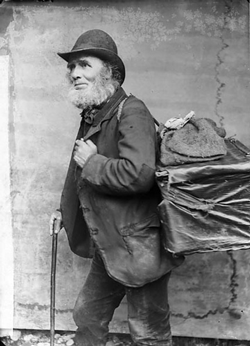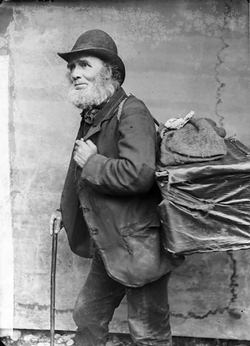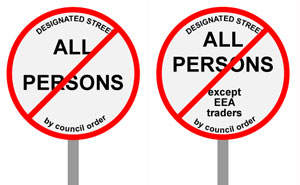10 February 2013 – Government BIS pedlar policy scrutiny

BAD POLICY!
HMG BIS is seeking to repeal the cultural identity and profession of pedlary.

Any person above 17 can apply for a Pedlars Certificate costing £12.25 per year.
The common law of pedlary has existed forever and was enshrined into Statute in 1697, updated in 1871 & 1881.
A pedlar has complete discretion to act within national law as a pedestrian trader whose self-employed economic activity is by private contract with the public. Pedlary is exempt from local council street trading regulation designed primarily for licensed static trading pitches that cause public safety issues like obstruction of the highway. Pedlars are mobile, can move and that is why they are not regulated.
Since 2007 government has been consulting to formulate updated legislation and whereas amending the Pedlars Act was the intention, pedlars are now confronted with URN12/605 & 606 with a new policy to repeal the Pedlars Act and provide criminal sanctions under local authority street trading regulation.
Here’s what regulations BIS propose to introduce to local adoptive street trading regulation the LG(MP)A if they achieve their policy to repeal the Pedlars Act:
important update 4 July 2014 – scroll to page 21 headed:
The government attempting to Repeal the Pedlars Act
and redefine pedlary within the LG(MP)A as proposed
in BIS consultation URN 12/605-606 will not increase
UK people’s freedom from regulation as argued but
will increase the burden of offence to be prosecuted
by Local Authorities because of paragraph 10 in the
LG(MP)A with regard to Offences.
Government proposed policy:
Exemption for pedlars from street trading regime
|
Trading as a pedlar is EXEMPT under the following conditions – |
(a) trading on foot, by means of visits from house to house; or (b) trading on foot, solely or partly by means other than visits from house to house, and each article which the person is selling or exposing or offering for sale, and each article used by him while trading for the pruposes connected with the trading, must be carried – |
 |
(a) on the trader’s person, without any means of support; or |
 |
(b) in or on a receptacle
(i) which is pushed or pulled by the trader; and (ii) which, together with any articles in or on the receptacle, does not exceed 1m length x 1m width x 2 metres high |
 |
The trader must leave any location that he is occupying with a view to trading no later than 10 minutes after he arrives there; but the trader may nonetheless occupy the location for longer than 10 minutes if
(a) the trader is occupying the location in consequence of one or more customers having approached him, and (b) he leaves the location as soon as he has no more customers to serve. |
 |
The trader must not occupy a location with a view to trading if, with a view to trading, he has at any point during the previous 3 hours occupied
(a) that location; or (b) a location within 50 metres of that location but the trader may nonetheless occupy the location for longer than 10 minutes if (a) the trader is occupying the location in consequence of one or more customers having approached him, and (b) he leaves the location as soon as he has no more customers to serve. Distance is to be measured in a straight line except to the extent that (a) the ground is not level; or (b) passage along the line is obstructed by buildings, fixed structures or private property. |
|
Designation of streets
|
A council may by resolution designate a street as a licence or consent street and may provide that the designation is to take effect in relation to – (a) all persons; or (b) all persons except service providers from another EEA state |
|
LG(MP)Act 1982 Schedule 4 Street Trading |
Paragraph 10 – Offences A person who engages in trading in a designated street without a consent or licence [a pedlar] shall be guilty of an offence. |
Pedlars contend that there are many problems with this proposed policy:
- BIS has failed to consult the 48 million people aged over 17 to be effected by this mischievous policy;
- BIS is attempting to introduce a cultural policy to eliminate a UK cultural profession that is recognised throughout Europe;
- BIS has given no substantive legal basis for repeal – de-regulation with regulation by another route is unlawful;
- BIS uses the European Services Directive to repeal national statute & ignores proposals to amend the national Pedlars Act;
- The proposals are said to be national but are limited only to the few local councils that have adopted the LG(MP)A;
- The proposals may have no effect on the many private Act jurisdictions or those preferring no street trading regulation;
- BIS argues that pedlars will be better off with minimum restriction & cost ignoring that they are already minimal;
- Under the Pedlars Act the pedlar has complete freedom & discretion to choose when, where, what and how to trade;
- The Pedlars Act provides the public with a liberty that has nothing to do with councils or their licensed street trading;
- Most shopping streets are less than 150 metres long so after 30 minutes of this proposed regime a pedlar must stop work for 3 hours before he can trade again in the same town – pedlary will not be viable;
- Trading as a pedlar is not differentiated from selling as a pedlar. Trading involves displaying, talking, & demonstrating and may not lead to selling anything. It is impossible for the pedlar or an officer to determine if a customer is approaching and neither will know when the 10 minute rule begins and ends;
- A pedlar will have to record a disproportionate amount of factual evidence of every step by time and distance to prevent allegation of an offence and Court prosecution;
- It is an undeniable fact that local authorities with private Acts rely on criminal prosecution for “acting without a street trading licence” instead of correctly bringing a civil prosecution for “not acting as a pedlar”;
- The meaning of “location” is subjective and therefore unjusticible;
- If a “location” is never established then neither the 10 minute nor 50 metre rules may apply;
- Under council designation powers a pedlar may be automatically guilty of an offence if found trading in a designated street and liable to be listed by the Criminal Record Bureau;
- It is not possible to reach a common sense interpretion of a designation with effect on “all persons” nor why BIS intend UK nationals to have less rights than EEA nationals;
- A designation effecting “all persons” seems to include shoppers, police, council bullies, vagrants & street sweepers;
- The policy seems to require a person to obtain a local licence in each and every jurisdictions intended to trade;
- Licences can be withdrawn for failure to attend a pitch, for not trading on particular days, for trading in other goods and can be refused without evidential basis on grounds of insufficient space;
- No pedlar will be able to monitor or challenge randomly timed designation resolutions in some 420 council jurisdictions;
- The policy exposes pedlars and the public to pre 1871 fiefdoms ruled by enforcers, bullies, rogues & vagabonds;
- The BIS definition of pedlary attempts to prescribe legislation in a series of random measurements void of legal transparency;
- Council officers have no powers of identification for prosecuting villains and vagrants who can give false names & addresses;
- Costs of increased police attendance has not been considered in the Impact Assessment URN12/606;
- Police income from certification cut by £49,000 but increased by the cost of attending councils need for identification;
- Pedlars contend that it is unjust to give enforcement powers to councils whose lobbyists campaign to get rid of pedlars;
- The policy will discriminate against persons unable to read or write, those with short-term memory; those unskilled in estimating distances or time-lapses & those less able to keep contemporaneous notes of every movement;
- The famous London onion-man is a potential victim as his bicycle is longer than 1 metre;
- This list is a work in progress… please send your contributions to robert@pedlars.info.
end
pedlars.info


